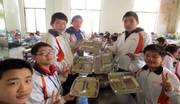
题目列表(包括答案和解析)

It is reported by Chinese Xinhua News that students waste more food than the national average. So the campaign on school food waste is getting popular across the country. The move is part of a national campaign started by students at different schools.
At East China University of Science, students who finish their food in the school dining hall get a special card when they return their plates after meals. Students can collect cards and exchange them for small gifts, such as books, schoolbags, magazines and umbrellas. “It’s been such a surprise,” said Liang Zhaoyun, 19, a student in Shanghai. “It has given us one more motivation to eat up our food.”
“The purpose of the campaign is not only to encourage students to finish their food. We hope it can also teach students to choose a more environment-friendly and healthy lifestyle,” said Tao Siliang from University of Traditional Chinese Medicine.
Other schools also pay attention to the quantity of food. At Nanjing No.9 Middle School, rice is divided into three different-sized bowls that students can choose from according to their own need. “It’s great because I can try different dishes at half price and don’t waste so much food,” said Fan Peng, 15, a student from this middle school.
What if you really can’t finish all your food? At Changchun Normal College, they provide a take-away service. “If you can’t finish all your food, you can get a box to take the left food home. Even if you feed the cat, it’s not wasted,” said Zhou Zeyong, a student who learns Chinese education.
“I’m happy that we’ve cut down waste since joining the school ‘eat-up’ meeting. But some food is poorly cooked, meaning that students are not willing to finish it all. Some schools have taken note of this. So if we hope students try to waste less food, we should also improve the service and keep an eye on the meal quality on weekdays at school. If not, you can’t complain students for throwing away much food,” said Wang Guangji, the head-teacher of Beijing No. 29 Middle School.
【小题1】Why did we start the campaign on food waste at schools? Because __________.
| A.food waste at school is very serious. |
| B.students should not eat more food |
| C.it is students’ duty to eat less food |
| D.it’s easy for schools to start a campaign |
| A.Students who buy some special cards. |
| B.Students who eat up all the food. |
| C.Students who do some dishes. |
| D.Students who spend money on gifts. |
| A.Getting small gifts is surprising. |
| B.Different-sized bowls make students happy. |
| C.Students should take a healthy lifestyle. |
| D.It’s a good idea to feed a cat with left food. |
| A.The campaign is only to encourage students to eat up food. |
| B.We try to think up many good ways to help clear plates. |
| C.We will make notes if students waste much food again. |
| D.We shouldn’t complain students for throwing away food |
Are the lives of city kids the same as those in villages? In lots of ways, they are very different. But what are the differences?
Hu Peng and his four friends decided to find them out. Earlier this month, they went to live for a week at Huagui Village near Xishui. They went door to door there and asked kids there lots of questions. They wanted to learn more about village kids’ everyday lives, so they asked questions like these: Do your parents teach you how to do housework? How much money do you usually spend on dinner? What would you do if a thief comes into your houses? They also asked 150 city kids the same question.
On April 12, the team gave a report to their class. They told about lots of differences between children’s lives in cities and those in villages. The biggest difference is independence. Hu’s team say that more than 60 percent of city kids can’t do much housework, but more than 80 percent of village kids can care for themselves.
City kids told Hu they cared about school a lot, and they had no time to wash clothes or make their beds. Village kids said they helped their parents with a lot: they cook, clean houses and feed farm animals, Hu’s team also saw that village kids had less pocket money. Many never use computers. They play in rivers or on mountains. Some don’t really like to make new friends.
Hu’s team said their trip gave them more self-confidence(自信心) because they were doing something by them-selves. But it also worried them a bit because they saw they still had a lot to learn. “When we grow up, our parents can’t take care of us,” Hu said. “We have to learn to take care of ourselves. ”
请根据短文内容完成下表信息:
|
Kids in the city |
Kids in the country |
|
Can’t do much housework |
1.____________________ |
|
No time to wash clothes or make bed |
2.____________________ |
|
Have pocket money |
Have less pocket money |
|
Use computers |
3.____________________ |
|
4.____________________ |
Don’t like to make new friends |
湖北省互联网违法和不良信息举报平台 | 网上有害信息举报专区 | 电信诈骗举报专区 | 涉历史虚无主义有害信息举报专区 | 涉企侵权举报专区
违法和不良信息举报电话:027-86699610 举报邮箱:58377363@163.com